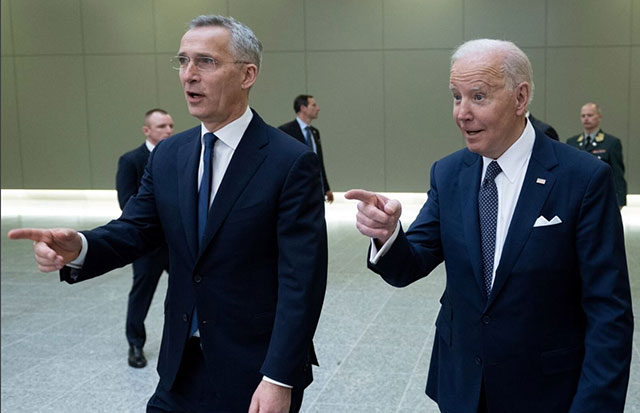As the war in Ukraine drags on, already diverging camps in the Atlantic Alliance are likely to fracture further.
Written by Eldar Mamedov
Read also
As the leaders of NATO gathered in Madrid for their summit on June 29, they predictably made a show of unity and solidarity in countering the Russian war of aggression against Ukraine and in defense of the “rules-based international order.” The final statement and the new “strategic concept” adopted at the summit project an image of an organization that has gone from being declared “braindead” by French president Emmanuel Macron only few years ago to one facing the future with a reinvigorated sense of mission and resolve.
Yet below the surface of unity and determination, fundamental questions about the future of the alliance abound. While all its members agree that Russia is responsible for the war, and support Ukraine’s defensive efforts, there are clear differences on what should constitute the West’s ultimate strategic goals.
The United States, United Kingdom, and nations in eastern Europe seem to embrace the view that a permanent weakening of Russia should be the goal. In the case of Poland and the Baltic trio of Estonia, Latvia, and Lithuania, that imperative is fueled by the traumatic history of their relations with Russia and a well-justified fear of Russian intentions — only recently President Putin delivered a speech in which he appeared to be laying territorial claims on Estonia. Weakening the aggressor’s capabilities is a sensible self-defense policy.
The emerging peace camp, led by Germany, France, and Italy, by contrast, advocates for a swift ceasefire and ensuing negotiations leading to a diplomatic settlement between Russia and Ukraine. They do not feel threatened by Russia directly and are worried about the economic costs of a protracted conflict on their industries and living standards. Hence Macron’s rhetoric about the need to find a “face-saving exit” for Putin and Italy’s peace initiative (that didn’t receive the recognition its authors hoped for).
Such differences are only bound to increase as the boomerang effects of anti-Russian sanctions set in. Reduced or interrupted energy supplies from Russia (which it redirects to other markets, like China and India, to its benefit), higher inflation, and lower growth could conspire to incite public unrest in Western Europe. These are the kind of consequences that a German business leader had in mind when he warned against “punishing ourselves more severely than the aggressor.”
The Russian economy is certainly taking a hit from Western sanctions, but Putin has an advantage of running an authoritarian state where the discontent can be violently quelled. Democratic Western leaders can afford no such luxury and will have to pay attention to the plight of their electorates. The rhetoric of unity alone will not be able to bridge the differences between the two camps.
Another fundamental question facing NATO is the U.S.’s long-term commitment to the alliance. That may sound counter-intuitive when Washington just announced new deployments to Europe, including creation of a permanent headquarters for the U.S. Army in Poland, and additional and “enhanced” deployments in Romania, the Baltic states, the UK, Spain, Italy, and Germany.
Yet the United States is gearing inexorably toward great power competition with China, which will be an organizing principle of its foreign policy in the decades to come. Even if the Madrid statement envisages a role for NATO in countering the Chinese threat, Washington’s primary partners in this endeavor are going to be the Indo-Asia-Pacific nations, not Europeans, except perhaps UK.
The relative importance of Europe in U.S. grand strategy will inevitably decline. There is already a growing discontent in the Republican and conservative ranks in the United States that an excessive entanglement in the European affairs is diverting attention and resources from containing China. When the former President Donald Trump suggested that the United States might withdraw from NATO, it should not be seen as a mere temporary aberration, but a sign of an enduring shift in the U.S. strategic focus.
In the face of these divisions and uncertainties, the notion of European strategic autonomy, championed by Macron, was meant to provide a new glue holding European security together. Some strides have been made in that direction, for example building out the nascent EU common security and defense policy. Yet, the war in Ukraine has exposed the limited appeal of this concept in parts of Europe, and a strong preference there for keeping the transatlantic bond intact. The strategic outlook may indeed be very different depending on whether you sit in Paris or Tallinn.
Given that the eastern Europeans perceive the threat from Russia as existential, they are not going to compromise on their reliance on NATO and United States in favor of a more (Western) European-centered security arrangement. Current and future U.S administrations may opt to deepen ties with them not only to counter Russia, but also to keep in check any real moves towards strategic autonomy by Europe’s Western nations. That was, in essence, Trump’s policy. With its enhanced military deployments in eastern Europe, Biden is continuiung it, even if cloaked in a more friendly language towards the “allies.”
France, Germany, and Italy, as a consequence, will be incentivized to pull themselves more tightly together to preserve their relevance and interests, particularly if, as expected, the economic situation becomes more dire and calls for an end to war grow more vocal. That also explains these countries’ relative lack of enthusiasm (except in the German Green Party) towards the prospects of Ukraine’s membership in both EU and NATO — in their view, such moves will further displace Europe’s geopolitical center of gravity towards the east, with the concomitant increase of American influence at their expense.
The more prolonged the war in Ukraine, the more divergent national perspectives within NATO and the EU will pull its members in different directions. The talk of transatlantic unity will do little to address the emerging cleavages.
























































